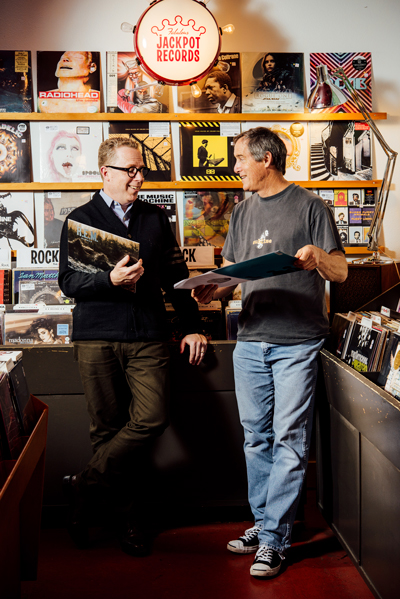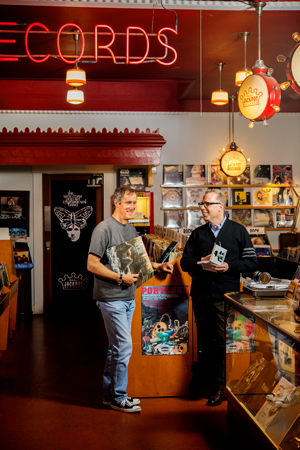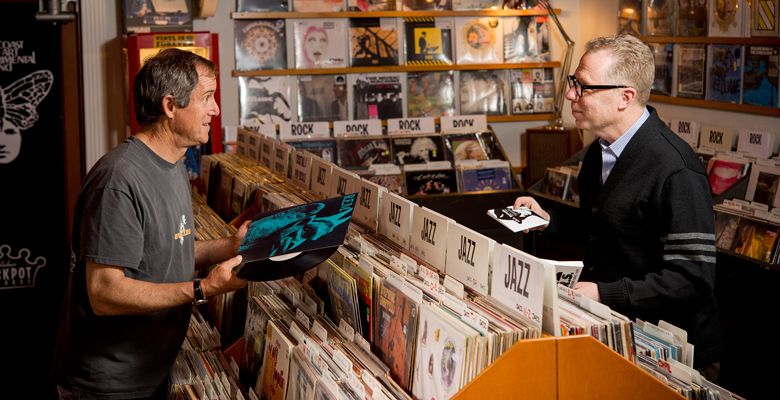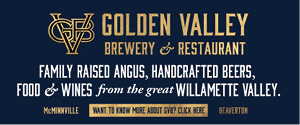Waxing on Music and Wine
On record with Jay Boberg and David Millman
Dig, if you will, an attempt to connect the currents of wine and music as they flow through two of Oregon’s premier Pinot players — Jay Boberg, co-founder of Nicolas-Jay Winery, and David Millman, managing director of Domaine Drouhin Oregon.
Both their stories trace back tangentially to California and the 1970s, when the West Coast was starting to challenge Europe — France, in particular — to be regarded as the only source of great wine in the world. The ’70s was also when some of California’s mega-producers were making and marketing cheap commodity wines for the masses.
To buck that trend, Oregon’s wine industry spun off. In a very different, specific pursuit, several independent out-of-state winemakers, many of them from California, traveled north to Oregon to pursue their dream of creating a Pinot Noir utopia, where the goal was quality, not quantity.
During the ‘70s, the status quo of music was also being uprooted.
“Musically what was going on was progressive rock,” Boberg said. Bands like Jethro Tull, Yes and Pink Floyd had achieved massive commercial success, but in the process, they were losing creative control, as record labels pressured them to keep churning out hits.
Like California wine, music had become a commodity.

Setting the Stage
Jay Boberg co-founded I.R.S. Records in 1979 with Miles Copeland III, brother of Stewart Copeland, drummer for The Police (you know, the band with Sting). I.R.S. offered an alternative to mainstream music, inspired by “punk rock.”
“It was rebellion,” Boberg remembered. “These bands established their own voice and took their place at the table. I think Oregon wine has done that in its own way, too.”
Over the past four decades, Boberg’s professional trajectory has mirrored that of Oregon’s wine industry. While the number of wineries grew from just a few to more than 600 today, likewise Boberg went from I.R.S. promoting indie upstarts like R.E.M., The Go-Go’s and The Buzzcocks, to becoming president of Universal Music Publishing and MCA Universal Records, where he helped launch the careers of The Roots, Sigur Rós, Mary J. Blige, Alanis Morissette, Sublime, blink-182 and many other million sellers.
Along the way, Boberg picked up a taste for wine. He owned a vineyard in Napa during the 1990s. “A lot of the relationships I have in wine, most of them started in music,” Boberg said. “Kermit Lynch was way into music, so I, in turn, got to pick his brain about wine. I was doing music for the Napa Wine Auction and met all kinds of winemakers.”
Boberg still works in music, currently as chairman of INgrooves, a digital music distribution service. But wine has largely supplanted his musical career.
Looking rockstar lean in a faded Sublime T-shirt and a somewhat road-weary, he’s just flown from Los Angeles to Portland, and will spend the next couple days touring vineyards and potential production facilities in the Willamette Valley, while blending wines for his Dundee, Oregon-based wine project, Nicolas-Jay. He co-founded the venture with longtime friend Jean-Nicolas Méo, winemaker of renowned Burgundian house Méo Camuzet. Boberg also inspired a Vinyl Series of wines, including a Rosé (aka “Pink Vinyl”) made with Tracy Kendall, Nicolas-Jay’s associate winemaker, and a Pinot Noir (aka “Red Vinyl”).
“It’s the same as in the music business,” he said. “It’s all about the song.”
David Millman was born in Berkeley, California. He started going to rock concerts in the mid-’70s. “When I was 13 or 14, no one thought twice about letting you go see a Queen show, Kiss or Alice Cooper.” He soon got into Kraftwerk, post-punk, techno-pop and new wave bands. “There was all this vibrancy. Locally, bands like Flipper and The Dead Kennedys were playing all the time. It was not hard to get into the energy.”
Millman and Boberg first met at UCLA, where both went to school, Boberg a few years before Millman.
“I saw Jay teach an extension class. Only a few years earlier, he had been the guy at UCLA putting on these really crucial shows: Talking Heads, R.E.M., The Bangles, Los Lobos, Violent Femmes... It’s music we still listen to as reference.”
Millman worked for CBS Records in college, followed by PolyGram Records after he graduated. In 1989, Boberg hired him as head of publicity at I.R.S.
Coincidentally, Boberg proved instrumental in Millman’s move to Oregon wine country in 2000. Through a wine-tasting group Boberg organized, Millman met Scott Wright, an independent radio promoter from California who traded in music industry life for one in Oregon wine.
“I remember when Scott brought a tank sample of his Chardonnay. It was like his demo record. Most demos are not that good, but his first vintage was really delicious,” Millman said.
Through Wright — who would go on to found Scott Paul Wines in Carlton, Oregon, and now runs Caveau Selections — Millman scored a gig promoting Domaine Drouhin Oregon. Fifteen years later, today Millman is the winery’s managing director.
“The only two careers I’ve had, wine and music, are things I love,” Millman said.
Talk about the Passion
I caught up with Jay Boberg and David Millman over dinner for a lively discussion to compare and contrast the worlds of music and wine.
Peter: How would you compare music and wine?
David: There are places where the comparison is pretty exact and others where it really diverges. With both, the hope is always to get better. As vines get older, you understand your land better, so experience should take you higher and higher to more complex and soulful places. Winemakers gather information so slowly, so they need time.
Jay: Wine is an art form in a way. Music is as well, obviously. There are so many decisions in the winemaking process that are very personal and have a huge impact on the wine. It’s the same decisions that go into making a record: the songwriting, the production, the playing, the instrumentation. These are similar to the fermentation, the yeast, when you pick, canopy management in the vineyard…

David: I think wine and music at their best are creative pursuits. Some songs and wines are so tasty, they’ll never get out of your head. And the way some people approach wine or a song is to look for the truly unique. On the other hand, there are wines and songs that are mass-produced and made for large consumption.
Jay: I think there are emotional connections, beyond literal. Music will touch people in a certain way, and they connect to it. That’s why people want to get close to the artist. I see some of that in the wine world now, where people want to have contact with the winemaker. They want to understand their vision, not in a creepy way but in a positive way. That’s very much like music.
David: Wine and music create a thread through people. If you wear a Talking Heads T-shirt, people who like the Talking Heads will just start talking to you. Wine in its own way can do that, too. For instance, tonight we’re having a bottle of Lingua Franca, so the next time I see a bottle, it will remind me of this dinner, talking about music and wine over this bottle. It’s a wonderful marker. It’s the soundtrack to our dinner.
Peter: I.R.S. stood for quality. Music lovers could buy a record put out by any artist on the label and feel fairly confident that they’d like it. Likewise, wine lovers are getting to the point where they can pick up just about any bottle of Oregon Pinot Noir and feel confident that it’s going to be good.
David: The Oregon cachet has been building for some time. If you go back to 2004 when “Sideways” came out, the impact that it had, and all the people who have moved here since and have made high-quality wine. The zoom Oregon is on is very exciting.
Jay: There’s buzz and momentum that you can definitely feel going on. In the music business, you’d say it was an “overnight hit” — five albums, 1,462 tour dates, and then an overnight sensation. People like David Adelsheim, David Lett and Véronique Drouhin did what is so tough to do, which is to start from nothing and build a reputation for an entire region that is now starting to go to another level of recognition.
Peter: Oregon is kind of like R.E.M. and The Go-Go’s, hard-working bands that put in a lot of sweat equity before becoming mega-stars.
Jay: The Go-Go’s had a massive cultural and social impact. Being an all-girl band, what they were wearing and how they talked about being young women, having their own point of view and running their business, that was as important as the music was.
When you sign a band, you have the ability to give their music a chance. You work with them and try to pull out the best they can offer and present it in hopefully the most convincing and effective way. Ultimately it was your own opinion and conviction. I believed from the absolute tips of my toes to the top of my head that this band or that artist was great.
The connection to wine is that we make wine we believe in, that we think is great. We’re working our butts off to make something that we think is extraordinary. Hopefully, there’s enough people out there in the world who will agree.
Peter: It seems like there’s more music coming out today than ever before, and more Oregon wine producers, too. How do you keep track of it all?
Jay: I’m not sure there’s more music than there’s ever been, but we have access to it everywhere, and it’s become decentralized. There are fewer artists that are in that super-superstar level, doing the equivalent of $10 to $20 million in sales — aside from Adele, that is.
David: Adele sells more physical product by a factor of 10 than anyone else. It’s extraordinary. The audience that buys her is an underserved audience. But, in the end, there are very few instant hits, right? If you get 95 points on a wine — a huge score — your mailing list may fill up. Another person may get a 95, and they don’t even get a phone call. It’s not always clear why that is. With music, we could talk about any number of bands who made great records — genius records that never went anywhere.
Jay: We’re not that far from ticking over on the appreciation meter before some of the best wines in Oregon become very hard to get.
Peter: Is promoting wine different from music?
David: In terms of music, when I first worked with DDO, the winery was like a band with a lot of hits that hadn’t done a lot of PR lately. They reminded me of bands I’d worked with who were very successful, but they didn’t bother telling people because they were too busy doing it. The Drouhin family has unimaginable depth, but is chronically modest. For instance, organic farming is something they did for years in Burgundy before telling anybody.
Jay: Oregon is still in its infancy. But over the past five or six years that I’ve been here, I’ve seen much more focus in the marketplace on Oregon wines. Just being in Chicago or Washington, D.C., or New York or Boston or even San Antonio, people are saying to me that there is much more interest in Oregon wines — especially Pinot Noir. It’s a very successful strategy, having a place that is known for a specific variety. Now, the perception is Oregon is making as good of Pinot Noir as anywhere in the world. Oregon has much more opportunity now to produce cult, collectible wines. I think it’s entirely possible that five years from now people will look at a $65 Oregon Pinot from a top-tier producer as a bargain.
David: There is precedent for that. It’s not easy to get Thomas or Cameron wine — blink and they’re gone. It doesn’t mean it’s worth more later, you just can’t get it. Part of the reason people buy these cult wines, like Screaming Eagle, is that you can resell them for more. There’s no real secondary market for Oregon wines yet. It’s fun seeing who gets really excited about Oregon wine. … People are consciously choosing it, not because it’s just more affordable, but because they actually love what this is.
Peter: There are rockstars in music. Is there an equivalent in wine?
Jay: You think about people like Tony Soter, who was at Etude, Spottswood, Araujo — one of the Oregon treasures is also responsible for a lot of the best Cabernets ever made. There are people in the wine business — similar to music — who have personalities that are much greater than life. Jim Clendenen (Au Bon Climat), Bo Barrett (Chateau Montelena Winery) — people who have been around a long time. Jim is so gregarious, a great guy who everybody likes. He creates this whole vibe. Then there are people who make wine in a much more silent manner…
David: There are opportunities for individuals who are great storytellers of their wines.
Peter: How do the business sides of music and wine differ?
Jay: The music business is actually small in terms of the number of people who participate from an economic standpoint. Michael Jackson’s “Thriller” sold 40 million copies, but it’s still just a fraction of the population. There are lots of people who listen to music, but they’re not participating in that economic chain. Almost anybody drinks wine. It’s a big percentage of the population. Maybe they don’t differentiate between Pinot Noir or this or that…
David: The business parts are less interesting. Distribution is always important. But the romantic parts of it … Music can connect you to such wonderful moments with people.
Jay: It’s the soundtrack of your life.
David: I’ve been at Domaine Drouhin for 13 years now, and the best experiences are always the stories of people who have had some significant moment: a first date, wedding wine, anniversary wine every year, special occasion. You get all these wonderful stories connected to it. That is like music. Wine and music are magic, and who doesn’t want magic in their lives, you know?
Peter Szymczak writes about food, wine and culinary tourism. He lives in the Red Hills of Dundee, Oregon.











